Belarus and Russia finally signed a designated nuclear-safety agreement

Intergovernmental agreement aimed at cooperation in nuclear safety as well as a number of other spheres has finally been signed in Minsk on February 1, 2013.
The document approved earlier by the Council of Ministers of the Republic of Belarus was signed by the Belarusan Energy Minister Aliaksandr Aziarets and by the head of “Rosatom” Sergei Kiriyenko, reports BelaPAN.
Let us recall that the subsidiary of “Rosatom” is building Belarus' first-ever nuclear power plant at the Astravets site in Hrodna region. The agreement provides for cooperation in improving a legal and regulatory framework for nuclear safety with consideration for the International Atomic Energy Agency's standards and aims to create and maintain effective means of protection against potential radiation hazards at Belarusan nuclear power engineering installations. Moreover, Belarus plans to use Russia's experience of creating a system to respond to and handle emergencies at its nuclear power plants.
When addressing the reporters at the construction site for the plant on February 1, Kiriyenko said that the facility would be the "safest" in the world. He also stressed that the plant would withstand a Fukushima-like earthquake or tsunami.
-
03.01
-
07.10
-
22.09
-
17.08
-
12.08
-
30.09








































